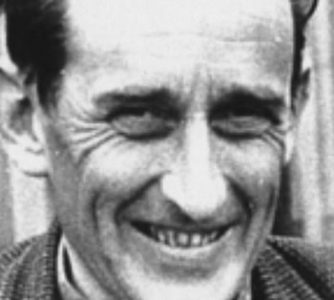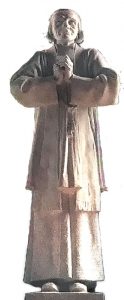This Saint was not made by eating well and being kind

by James K Baxter
James K. Baxter wrote this article for the feast of St. John Vianney, Curé (parish priest) of Ars, in the form of a conversation. His friend, as it were, starts it off.
“The Church makes some very peculiar choices at times — I mean, in her choice of saints. Take St John Vianney, the Curé of Ars. He's the patron saint of parish priests. Well, of course he was a parish priest. I suppose that's why they chose him. But he'd be a terrible man to meet. Ignorant, eccentric, narrow-minded — he clamped down on all dancing in the parish -ferociously ascetic, superstitious — he used to think the devil visited him at night—”
“Perhaps the devil did. The devil tempted Our Lord.”
“Oh come now! The best explanation of poltergeists is in terms of abnormal psychology. The Curé must have been thoroughly neurotic.”
“You're talking about the man I love."
“I didn't know you were a fan of his. Why on earth . . . ? ”
“You mean, how could I admire him when I also admire Brendan Behan's Borstal Boy?”
“Something like that. I thought you were a progressive thinker.”
“Maybe there's not so much difference between the Curé and Behan as you think. They both have that magnificent simplicity that belongs to a mind saturated in the Faith from the beginning of consciousness, and perhaps from before consciousness — a peasant mind, a mind like a tree-root.”
“But he was a bigot."
“I don't know about that. I can't see how he had time to be. He didn't argue about theology much. He lived it instead. Seventeen hours a day in the confessional.”
“I certainly admire his powers of endurance. But surely he's the saint of simplicism, not of simplicity. If the modern clergy followed him.”
“If they followed him, they would all be poor. And God would begin to possess their souls.”
“My word, you're beginning to talk like him! What's the benefit of poverty? I mean, there's no sense in living on a potato and a sip of milk a day. It would ruin a man's health.”
“When, and if, we go to Heaven, the charity we showed on earth will be more important than our state of health. I've got a full gut and the Curé had an empty one. People are eating mud and grass in India.”
“You won't help them by starving yourself.”
“I don't know. I could give the money to them. By starving myself I could keep other men alive. And God would be glad about it. But I don't do it. I only talk about it. The Curé acted — that's why I love him.”
 “He's out of date.”
“He's out of date.”
“I'm not so sure about that. A few years ago, I was kneeling in a church in Madras. I had bad dysentery — amoebic and bacillary — at the same time. I couldn't hold down anything but biscuits and black coffee. And I was kneeling there in the bottom of a pit of exhaustion and depression: And I looked up and saw this little neat old man standing beside the altar.”
“Don't tell me you had a vision.”
“No. It was a statue of him. But the Indians had put it there because they knew he was one of them — one of the poor, a man who didn't want anything but God.”
“Did he cure your dysentery?”
“No. But he taught me the spiritual meaning of poverty. I went out and gave a young leper money and put my arm round his shoulders.”
“That was hardly hygienic.”
“It's never hygienic down at the bottom of the pit. But that's where one finds Christ. And that's where St John Vianney found him.”
“All right then, he was poor. But he was also narrow-minded.”
“He couldn't have been too narrow-minded if they came from Paris to confess to him. Perhaps a hatred of sin looks narrow-minded from the outside. But the Curé must have loved his penitents. He was prepared to suffer for them.”
“You mean, those visits of the devil?"
“Yes.”
“Sheer medievalism.”
“Why should they be? The devil hates to see people turn to God. He tries to prevent them from approaching the Cross. And the Curé was standing all his life beside the Cross. He was always in a supernatural dimension. It's not strange then that he had to wrestle with the devil on behalf of his penitents:”
“What's he got to teach us? We're a different generation. Science, tv, education, aerodynamics — it's a new universe.”
“Perhaps it only looks like that. If we were prepared to strip ourselves as the Curé did — throw away our material and mental possessions — then we'd go naked and suffering into the arms of Christ. And He'd cover us with His own garments.”
“You talk like a mystic.”
“No. It's practical theology. Saints aren't made by eating well and paying one's debts and being moderately kind. Saints are made by entering into the world of the Passion itself. They have to have nothing but God before they can be wholly possessed by God.”
“That's rather too extreme a view for me. I like my books and pictures.”
“So do I. And I admit only a few are called to a vocation of absolute poverty. But the Curé was. And it pulls at my heart like a magnet. It made him entirely real. The pure water doesn't rise in the bog; it comes bubbling out of the rock. And that kind of rock can only be formed by asceticism.”
One finds Christ at the bottom of the pit
“All right. All right. The Curé was poor. The Curé was a holy man. Maybe the devil did annoy him. But he was intolerably ignorant.”
“He thought that himself. When another priest circulated a letter to the Bishop saying that John Vianney was far too ignorant to be allowed to be a parish priest, he read it and put his own name at the bottom and sent it on to the Bishop. That's another reason I love him. His humility was so great that there was no obstacle when the Holy Spirit wanted to use him as His instrument.”
“We can't be like him. It wouldn't work nowadays.”
“You think not? When it becomes a social nuisance to be poor and chaste and holy and humble — when the Church forgets St John Vianney — then will be the time to mourn for the Church. But the Church hasn't forgotten. She's made him the patron saint of Parish Priests.”
“Some of them may not like that much.”
“They may not. But they're supposed to imitate him. And I think we should as well. Sometimes I ask the Curé to pray for me and give me the capacity to make a thoroughly good confession.”
“All right. You've made your point. But the Curé's only one saint among many.”
“He is. But I love him as much as I love any. He is one of the boulders out of which the Church is built.”
 Entries(RSS)
Entries(RSS)